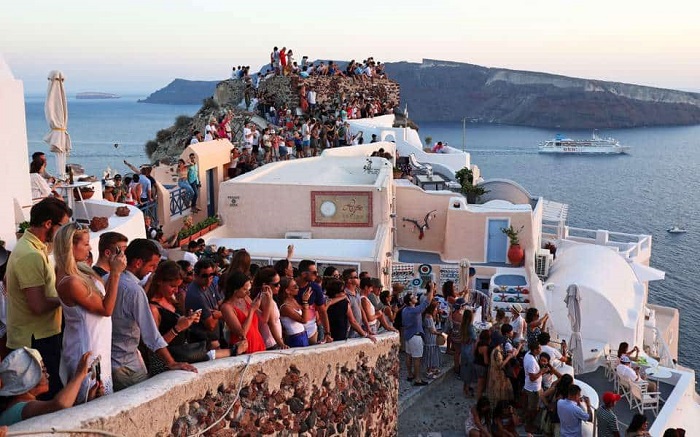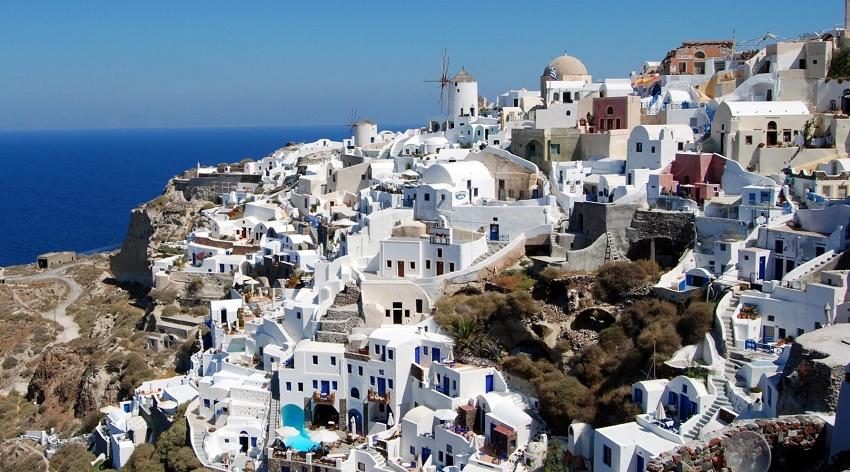Are you dreaming of an idyllic vacation in the stunning Greek islands? Well, get ready to immerse yourself in the beauty of this archipelago while also learning about sustainable tourism practices. In this article, discover how the Greek Islands have been implementing sustainable measures to preserve their natural and cultural heritage. From eco-friendly accommodations to conservation efforts, these islands are leading the way in responsible tourism. So, pack your bags and get ready to explore the enchanting Greek Islands while minimizing your environmental impact!
Environmental Conservation
Energy Efficiency
One of the key principles of sustainable tourism in the Greek Islands is energy efficiency. By implementing energy-efficient practices, such as using renewable energy sources and optimizing energy consumption, the islands aim to minimize their carbon footprint. This includes the use of solar power for heating and electricity, energy-efficient lighting systems, and the encouragement of guests to switch off lights and appliances when not in use. By prioritizing energy efficiency, the islands not only reduce their impact on the environment but also promote a more sustainable and responsible form of tourism.
Water Conservation
Water is a precious resource on the Greek Islands, and sustainable tourism practices emphasize the importance of water conservation. Local communities and businesses are encouraged to implement water-saving measures, such as the use of water-efficient fixtures and fittings, rainwater harvesting systems, and the promotion of water-saving practices among tourists. By conserving water, the islands can ensure the long-term sustainability of their water resources and maintain the delicate balance of their ecosystems.
Waste Management
Waste management plays a crucial role in sustainable tourism practices in the Greek Islands. Efforts are made to minimize waste generation and promote recycling and composting. Waste separation systems and recycling facilities are implemented across the islands, allowing visitors and locals to properly dispose of their waste. Additionally, businesses are encouraged to reduce single-use plastics and adopt sustainable packaging practices. By effectively managing waste, the Greek Islands can minimize their environmental impact and preserve their natural beauty for future generations to enjoy.
Preservation of Cultural Heritage
Protection of Archaeological Sites
The Greek Islands are rich in cultural heritage, with numerous archaeological sites dating back thousands of years. Sustainable tourism practices focus on protecting these sites and ensuring their preservation for future generations. Measures such as visitor limits, controlled access, and the enforcement of strict guidelines are implemented to prevent any damage or harm to these precious historical sites. The collaboration between local communities, archaeologists, and tourism authorities is crucial in safeguarding the cultural heritage of the islands.
Promotion of Local Crafts and Traditions
Sustainable tourism practices also emphasize the promotion of local crafts and traditions. By supporting local artisans and businesses that produce traditional crafts, the islands can sustain their cultural heritage and provide economic opportunities for the local communities. Visitors are encouraged to purchase authentic local crafts as souvenirs, supporting the continuation of traditional skills and preserving the unique cultural identity of the Greek Islands.
Respect for Local Customs and Practices
Respect for local customs and practices is an important aspect of sustainable tourism in the Greek Islands. Visitors are encouraged to familiarize themselves with local traditions and follow cultural etiquette. This includes dressing appropriately when visiting religious sites, respecting local customs and celebrations, and being mindful of the local way of life. By respecting the local culture and traditions, tourists not only contribute to the preservation of the islands’ heritage but also enhance their own travel experience by immersing themselves in the local culture.
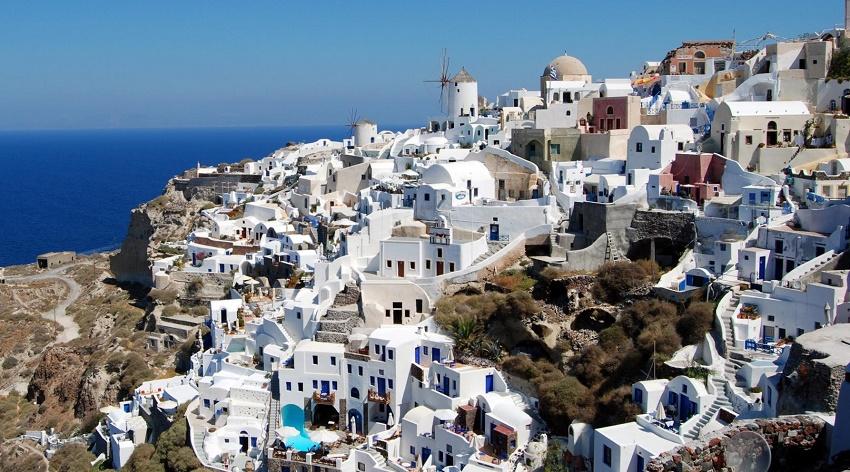
Support for Local Economy
Promotion of Local Products and Businesses
Supporting the local economy is a key component of sustainable tourism in the Greek Islands. Visitors are encouraged to purchase locally made products and support local businesses. From traditional handicrafts to locally sourced food and beverages, the islands offer a wide range of authentic products that reflect the unique character of each destination. By choosing to buy local, tourists contribute to the economic development of the islands and ensure that the benefits of tourism reach the local communities.
Job Creation
Sustainable tourism practices also focus on job creation in the Greek Islands. By promoting tourism as a sustainable source of income, the islands provide employment opportunities for the local population. Beyond traditional tourism jobs, sustainable tourism initiatives also promote the development of skills in sustainable practices, conservation, hospitality, and cultural preservation. This not only benefits the local economy but also empowers local communities by providing them with stable income and the ability to actively participate in the tourism industry.
Fair Trade Practices
In order to ensure a fair and equitable distribution of the benefits of tourism, fair trade practices are encouraged in the Greek Islands. This includes fair wages and working conditions for tourism employees, fair prices for locally produced goods, and transparent business practices. By promoting fair trade, the islands aim to create a sustainable and inclusive tourism industry that benefits both the local communities and the visitors.
Community Engagement
Education and Awareness Programs
Community engagement is vital for the success of sustainable tourism in the Greek Islands. Education and awareness programs are implemented to educate both the local community and tourists about sustainable practices and the importance of preserving the environment and cultural heritage. Workshops, seminars, and educational campaigns are organized to promote responsible tourism behavior and empower individuals to make informed choices that contribute to the sustainability of the islands.
Local Community Involvement
The active involvement of the local community is key to the success of sustainable tourism initiatives in the Greek Islands. Local residents are actively engaged in the decision-making processes, and their input is valued in shaping the future of tourism. Community-led initiatives are encouraged, such as the establishment of community-owned accommodations or businesses that directly benefit the local economy. By involving the local community, sustainable tourism ensures that the voices and needs of the residents are heard and respected.
Tourist-Local Interaction
Sustainable tourism practices promote positive interactions between tourists and locals. This includes opportunities for cultural exchange, such as local festivals, traditional music and dance performances, and participation in community activities. By fostering meaningful connections between visitors and locals, sustainable tourism enhances the travel experience and creates a deeper understanding and appreciation of the Greek Islands’ culture and way of life.
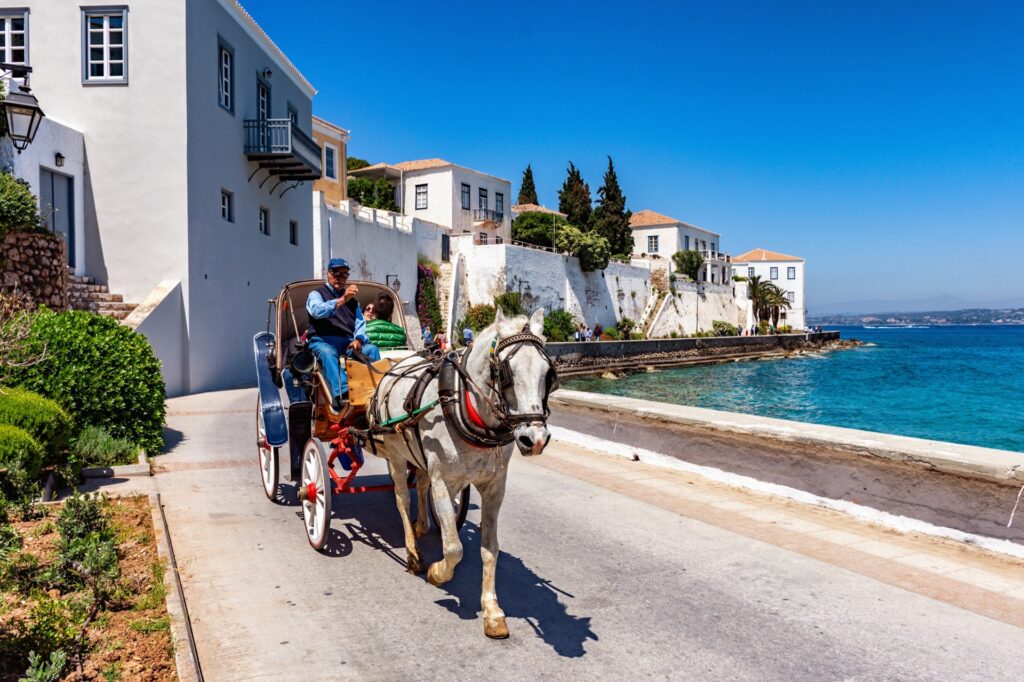
Transportation and Access
Promotion of Public Transportation
Promoting the use of public transportation is a key aspect of sustainable tourism in the Greek Islands. Encouraging visitors to use buses, ferries, and other forms of public transport not only reduces traffic congestion but also minimizes the carbon footprint associated with individual car travel. The islands invest in the development and improvement of their public transportation networks to make them more accessible and convenient for both locals and tourists.
Encouraging Sustainable Modes of Transport
In addition to public transportation, sustainable tourism practices in the Greek Islands promote sustainable modes of transport such as cycling and walking. By providing well-maintained pathways and cycling routes, as well as pedestrian-friendly infrastructure, the islands encourage visitors to explore the destinations on foot or by bike, reducing the reliance on motorized vehicles. This not only reduces carbon emissions but also allows for a more immersive and sustainable travel experience.
Reducing Carbon Footprint
Reducing the carbon footprint associated with tourism is a priority for the Greek Islands. Sustainable tourism practices focus on minimizing the use of fossil fuels and promoting energy-efficient transportation options. This includes the adoption of electric vehicles, the encouragement of carpooling, and the provision of charging infrastructure for electric vehicles. By reducing carbon emissions, the islands contribute to the global effort to combat climate change and preserve the natural beauty of the environment.
Managing Visitor Numbers
Visitor Caps and Tourist Arrivals
Managing visitor numbers is essential for maintaining the sustainability of the Greek Islands. By implementing visitor caps and controlling the number of tourist arrivals, the islands can ensure that the destinations do not become overcrowded and that the natural and cultural resources are preserved. Visitor management strategies may include the introduction of reservation systems, timed entry tickets, and restrictions on the number of visitors to sensitive areas. By managing visitor numbers, the islands can strike a balance between tourism and environmental preservation.
Seasonal Distribution of Tourism
Promoting a more even distribution of tourism throughout the year is another aspect of sustainable tourism in the Greek Islands. By extending the tourism season and reducing the dependence on peak periods, the islands can alleviate the strain on infrastructure and natural resources caused by high tourist influxes. This includes the development of year-round attractions, events, and activities that appeal to visitors during the shoulder seasons and the promotion of off-peak travel through targeted marketing campaigns.
Tourism Impact Assessment
To effectively manage visitor numbers, sustainable tourism practices involve conducting regular tourism impact assessments. These assessments evaluate the environmental, social, and economic impacts of tourism on the Greek Islands and help identify areas that require improvement or modification. By closely monitoring and assessing tourism impacts, the islands can make informed decisions to ensure the long-term sustainability and resilience of their destinations.

Protecting Natural Resources
Conservation of Marine Environment
The rich marine environment of the Greek Islands is a valuable natural resource that requires protection. Sustainable tourism practices focus on marine conservation measures such as the establishment of marine protected areas, the promotion of responsible boating and diving practices, and the monitoring of water quality. Awareness campaigns are conducted to educate visitors about the importance of preserving the marine ecosystem and practicing responsible marine tourism activities to minimize negative impacts.
Preservation of Wildlife and Plants
The Greek Islands are home to diverse wildlife and plant species, many of which are endemic and rare. Sustainable tourism practices aim to protect and preserve these unique biodiversity hotspots through the establishment of nature reserves and wildlife sanctuaries. Additionally, tourists are educated about the fragility of the local ecosystems and the need to respect and protect these natural habitats. By safeguarding wildlife and plants, the islands ensure the sustainability of their natural resources for future generations.
Protection of Natural Landscapes
Preserving the natural landscapes of the Greek Islands is a fundamental aspect of sustainable tourism. Measures such as land zoning, land use planning, and the enforcement of building regulations are implemented to protect the scenic beauty and integrity of the destinations. Specific areas of natural importance, such as forests, wetlands, and mountains, are given special attention to maintain their ecological value. By protecting natural landscapes, the islands maintain their allure as sustainable tourism destinations and ensure the preservation of their unique natural beauty.
Responsible Tour Operations
Certifications and Eco-Labels
Responsible tour operations in the Greek Islands often seek certifications and eco-labels that validate their commitment to sustainability. Certifications such as Green Key and Travelife recognize businesses that meet specific sustainability criteria, from waste management and energy efficiency to community engagement and cultural preservation. By choosing certified tour operators, visitors can ensure that their travel experiences align with sustainable tourism principles and support responsible businesses.
Sustainable Accommodation Options
Sustainable accommodation options are widely available in the Greek Islands, ranging from eco-friendly hotels and resorts to traditional guesthouses. These accommodations prioritize energy and water conservation, waste management, and the use of locally sourced materials. Visitors seeking sustainable travel experiences can choose to stay in these accommodations, supporting responsible practices and minimizing their environmental impact during their stay.
Ethical Tour Operators
Ethical tour operators play a crucial role in sustainable tourism in the Greek Islands. These operators prioritize responsible tourism practices, respect for local communities and cultures, and the protection of natural resources. They offer tours and activities that are designed to minimize negative impacts and maximize positive contributions to the social and environmental well-being of the destinations. By choosing ethical tour operators, visitors can ensure that their tourism activities align with sustainable principles and benefit the local communities.
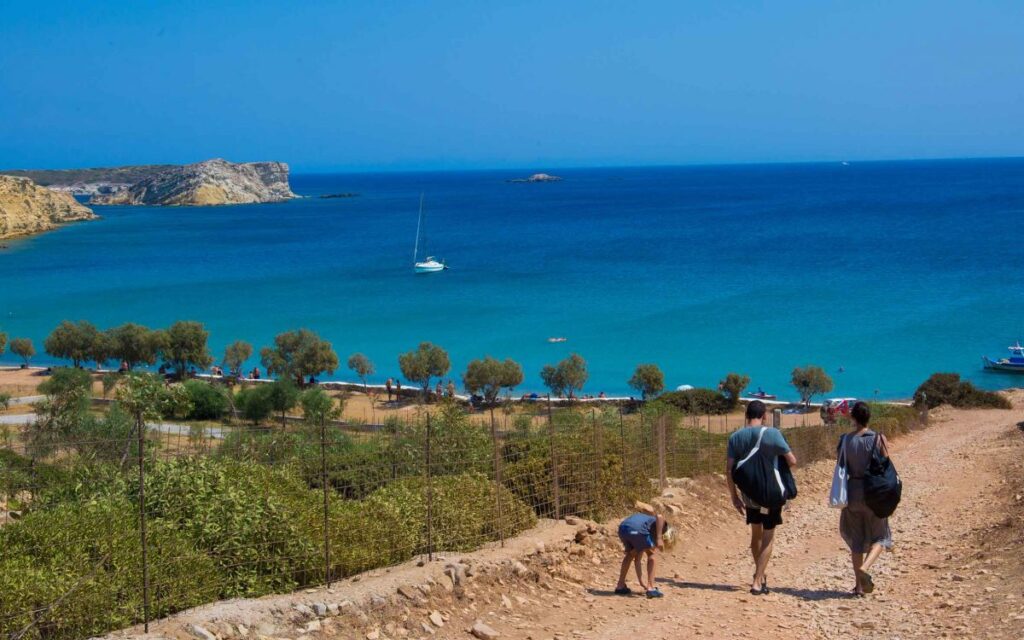
Promotion of Responsible Travel
Responsible Travel Guidelines
To promote responsible travel, guidelines are developed and communicated to visitors in the Greek Islands. These guidelines provide information on how to minimize environmental impacts, respect local customs and traditions, and support the local economy. Visitors are encouraged to follow these guidelines and make informed choices during their stay. By adhering to responsible travel practices, tourists contribute to the sustainability of the destinations and help preserve their natural and cultural heritage.
Educating Tourists on Sustainable Practices
Education plays a critical role in promoting sustainable tourism in the Greek Islands. Tourists are provided with information and resources that raise awareness about sustainable practices and their importance. This includes brochures, signage, and online platforms that highlight the environmental and cultural sensitivities of the islands. By educating tourists, the islands empower visitors to make mindful choices that align with sustainable tourism principles and foster a positive and responsible travel experience.
Responsible Travel Marketing
Responsible travel marketing is a key strategy for promoting sustainable tourism in the Greek Islands. Destination marketing campaigns highlight the unique natural and cultural attributes of the islands, emphasizing their commitment to sustainability. By showcasing responsible travel experiences, the islands attract visitors who value sustainable tourism practices and are willing to support destinations that prioritize environmental and cultural conservation. Responsible travel marketing plays a vital role in shaping the perception of the Greek Islands as sustainable tourism destinations.
Collaboration and Partnerships
Government Support and Policies
Collaboration between the government and tourism stakeholders is essential for the success of sustainable tourism in the Greek Islands. Governments play a crucial role in developing and implementing policies that support sustainable practices, such as legislation on waste management, conservation, and cultural protection. They provide financial incentives and grants to businesses that adopt sustainable practices and actively engage in promoting sustainable tourism. By working together, the government and tourism industry can create an enabling environment for sustainable tourism to thrive.
Private Sector Initiatives
Private sector initiatives play a significant role in advancing sustainable tourism practices in the Greek Islands. From hotels and tour operators to restaurants and transportation providers, the private sector has the capacity to implement innovative and sustainable solutions. Private sector initiatives often involve collaborations with local communities, NGOs, and government bodies to develop and implement sustainable tourism strategies. These initiatives contribute to the economic development of the islands and foster a sustainable and responsible tourism industry.
NGO Involvement
Non-governmental organizations (NGOs) play a vital role in promoting sustainable tourism in the Greek Islands. These organizations work closely with local communities, businesses, and government bodies to advocate for sustainable practices and develop initiatives that prioritize the protection of the environment and cultural heritage. NGOs provide valuable expertise, resources, and support to sustainable tourism projects, ensuring that the islands’ sustainability goals are achieved. Their involvement strengthens the collective effort towards sustainable tourism and fosters partnerships that benefit the islands and their communities.
In conclusion, sustainable tourism practices in the Greek Islands encompass various aspects, ranging from environmental conservation and preservation of cultural heritage to support for the local economy and responsible travel initiatives. By implementing these practices, the Greek Islands strive to strike a balance between tourism development and the preservation of their natural and cultural resources. Through collaboration, education, and innovative solutions, the islands are working towards a sustainable and responsible tourism industry that benefits both the local communities and the visitors. As a responsible traveler, by choosing to visit the Greek Islands and embracing sustainable tourism practices, you contribute to the preservation of these remarkable destinations and ensure that future generations can also experience their beauty and charm sustainably.
